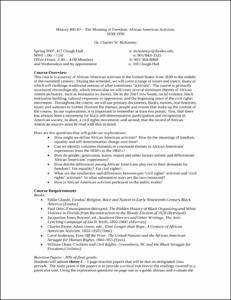Please use this identifier to cite or link to this item:
http://hdl.handle.net/10267/3337Full metadata record
| DC Field | Value | Language |
|---|---|---|
| dc.contributor.author | McKinney, Charles W. | - |
| dc.date.accessioned | 2009-02-12T18:19:57Z | - |
| dc.date.available | 2009-02-12T18:19:57Z | - |
| dc.date.issued | 2007-01-10 | - |
| dc.identifier.uri | http://hdl.handle.net/10267/3337 | - |
| dc.description | This syllabus was submitted to the Office of Academic Affairs by the course instructor | en_US |
| dc.description.abstract | This course is a survey of African American activism in the United States from 1830 to the middle of the twentieth century. During the semester, we will cover a range of issues and topics, many of which will challenge traditional notions of what constitutes “activism”. The course is primarily structured chronologically, which means that we will cover several dominant themes of African American history, such as resistance to slavery, life in the Jim Crow South, racial violence, black institution building, cultural responses to oppression, and the beginning years of the civil rights movement. Throughout the course, we will use primary documents, books, movies, oral histories, music and websites to further illumine the themes, people and events that make up the content of the course. In our explorations, it is important to remember at least two points: first, that there has always been a movement for black self-determination, participation and recognition in American society, in short, a civil rights movement; and second, that the record of African American sources must be read with this in mind. Here are few questions that will guide our explorations: • How might we define African American activism? How do the meanings of freedom, equality and self-determination change over time? • Can we identify common elements or consistent themes in African Americans’ experiences from the 1830’s to the 1960’s? • How do gender, generation, status, region and other factors inform and differentiate African Americans’ experiences? • How did the differences among African Americans play out in their demands for freedom? For equality? For civil rights? • What are the similarities and differences between pre-“civil rights” activism and “civil rights” activism? In what substantive ways are the two connected? • How is African American activism portrayed in the public realm? | en_US |
| dc.language.iso | en_US | en_US |
| dc.publisher | Memphis, Tenn. : Rhodes College | en_US |
| dc.relation.ispartofseries | Syllabi CRN | - |
| dc.relation.ispartofseries | 27137 | - |
| dc.rights | Rhodes College owns the rights to the archival digital objects in this collection. Objects are made available for educational use only and may not be used for any non-educational or commercial purpose. Approved educational uses include private research and scholarship, teaching, and student projects. For additional information please contact archives@rhodes.edu. Fees may apply. | - |
| dc.subject | History, Department of | en_US |
| dc.subject | Syllabus | en_US |
| dc.subject | Text | en_US |
| dc.subject | Curriculum | en_US |
| dc.subject | 2007 Spring | en_US |
| dc.subject | Civil rights | en_US |
| dc.title | HIST 405-01, The Meaning of Freedom: African American Activism, 1830-1950, Spring 2007 | en_US |
| dc.type | Syllabus | en_US |
| Appears in Collections: | Course Syllabi | |
Files in This Item:
| File | Description | Size | Format | |
|---|---|---|---|---|
| 2007_sp_HIST_405-01.pdf | 54.46 kB | Adobe PDF |  View/Open |
Items in DSpace are protected by copyright, with all rights reserved, unless otherwise indicated.